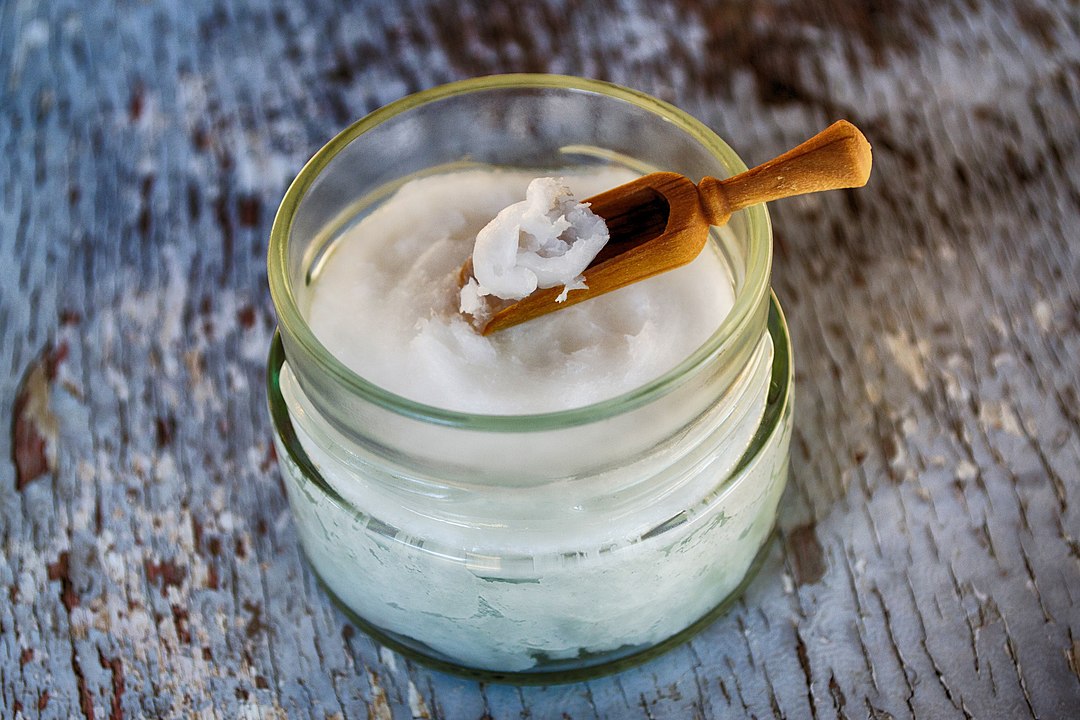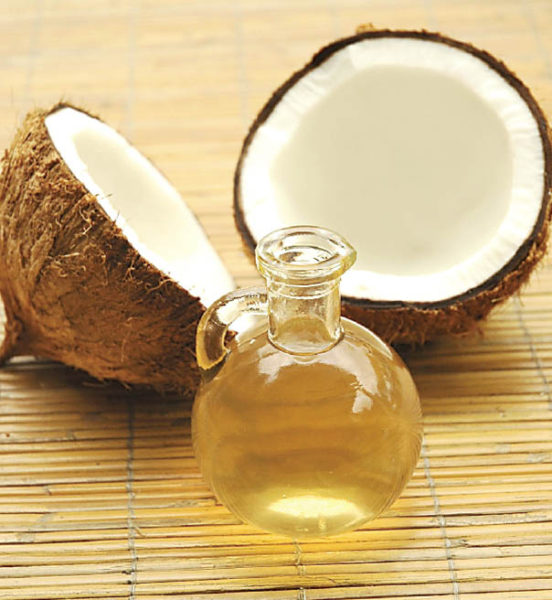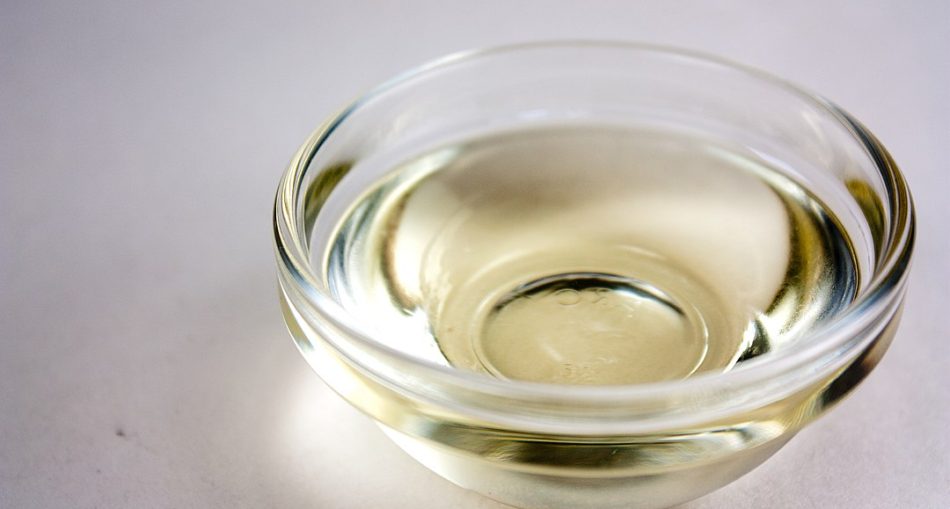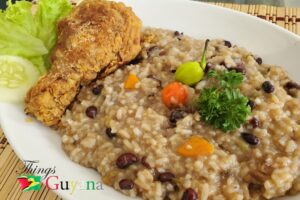You can be sure to find a jar or bottle of Coconut Oil tucked away in many households across Guyana. Particularly in the countryside, the folks would harvest their own coconuts from plantations and make their own coconut oil. While they would use it in cooking, this oil is also bottled and is sold at local markets. Coconut Oil is only one of the many products from coconut trees which provide us with the thirst-quenching coconut water and is used for many purposes.

Creamy Coconut Oil – Photo by: By greek food ta mystika – https://www.publicdomainpictures.net/en/view-image.php?image=237603&picture=coconut-oil-on-wooden-spoon, CC0, https://commons.wikimedia.org/w/index.php?curid=74227446
What is Coconut Oil?
Coconut Oil is an edible oil that is extracted from the kernel or flesh of the coconut. Mature coconuts are typically harvested for the production of coconut oil. While Coconut oil is typically available as a liquid in Guyana, it can also be turned into a creamy, almost solid state. There are two processes that can be used to make coconut oil; the dry process and the wet process.
Interesting Tip
- The state of Coconut Oil can change. For example, when placed in temperatures about 75 degrees Fahrenheit, coconut oil remains liquid.
- Anything below that, and coconut oil becomes a thick creamy mixture than can be boiled and remade into the liquid oil state.
- The largest producer of coconut is The Philippines.
The Dry Process of making Coconut Oil

Coconut and Coconut Oil – Photo By Phu Thinh Co – Dầu dừa, CC BY-SA 2.0, https://commons.wikimedia.org/w/index.php?curid=53249856
During the dry process of making coconut oil, the flesh of the coconuts are removed from the shells with tools resembling knives.The kernels, also known as copra are then put to dry in the sunlight or dried by fire or in kilns. The copra is then pressed thus producing a enriched protein and fibre mash and coconut oil. The mash is unfit for human consumption because it is of low quality and is instead fed to animals like cattle, sheep and goats. There is no process to extract the protein from the mash.
The Wet Process of making Coconut Oil
In the wet process of making coconut oil, coconut milk is used instead of the copra. An emulsion of oil and water is made by the proteins in the coconut milk which needs to be separated to collect the oil. Typically the oil is recovered by boiling but the result is a discoloured oil. The wet process also use an alternative combination of modern techniques including pre-treatment like cold, heat, acids, enzymes, elecrolysis, steam distillation or equipment like centrifuges. However, the wet process produces a lower yield of coconut oil.
Nutritional Value Of Coconut Oil
Each 100 grams of Coconut Oil contains:
- Saturated Fat: 82.5 g
- Monounsaturated Fat: 6.3 g
- Polyunsaturated Fat: 1.7 g
- Vitamin E: 3 mg(20%)
- Vitamin K: 0.6 μg (1%)
- Iron: 0.05 mg
- Phytosterols 86 mg
Health Benefits Of Coconut Oil
While all of the following benefits is not guaranteed to everyone, many persons can benefit from using Coconut Oil.
- Healthy Fats – Coconut Oils raises the good cholesterol levels and also contain heart healthy fatty acids like long-chain triglyceride (LCTs), medium-chain triglycerides (MCTs) and Ketones. These encourage your body to burn fat and they are a quick energy source to body and brain.
- Heart Health – The Medium-chain triglycerides found in Coconut Oil increases calories the body burns as opposed to longer-chain fatty acids. However it is rich is calories and can cause weight gain.
- Antimicrobial Effects – About fifty percent (50%) of the fatty acids in coconut oils are lauric acid which forms monolaurin when digested. Lauric acid and monolaurin kill harmful bacteria, viruses, and fungi.
- Reduces Hunger – Medium-chain triglycerides found in Coconut Oil can known to reduce hunger and leads to the consumption of less calories.
- Protects Hair, Teeth and Skin – Coconut Oil reduces dry skin symptoms as well and eczema. It also protects against the harmful Ultraviolet (uv) rays and hair damage. Swishing some coconut oil in your mouth, also known as oil pulling, may improve dental health and reduce bad breath.
Uses of Coconut Oil
- Coconut Oil can be used for high-heat frying because of its high saturated fat content.
- This oil can also be substituted for butter or vegetable oil in some recipes and can even be used as a salad dressing!
- Applying Coconut Oil to the skin can soften and protect skin and help in repairing cracked heels and chapped lips.
- Oil pulling with Coconut Oil can protect against bacteria like Streptococcus mutans in the mouth.
- Some anti-bacterial properties of Coconut Oil can fight infections.
- Coating your hair in Coconut Oil may reduce the loss of protein and help keep the hair healthy.
- Coconut Oil is a great natural deodorant because of its strong antibacterial properties.
- Coconut Oil may helping in fastening the healing of minor scrapes and cuts by applying directly to wound and covering with a bandage.
- It can also be used as a makeup remover.
- Since Coconut Oil is a carrier oil that helps in applying essential oils to the skin, it is combined and said to be effective in repelling mosquitoes.
- A mixture of Coconut Oil and baking soda can remove stains on furniture and carpets.
- The oil is also used as a polish and brings a natural shine to furniture.
Interesting Tip
- Coconut Oil can also be used to make homemade mayonnaise and sugar-free dark chocolate.
How to make Coconut Oil
Ingredients
- 10 dried coconuts
Method
- Remove white flesh of coconuts and grate using a grater.
- Add grated coconut to a bucket and add about eight (8) cups water.
- Massage and squeeze out liquid, separating the dried coconut flesh. Repeat until done.
- Add water to grated coconut and strain again.
- Strain and leave liquid overnight so that the cream can develop.
- By then mixture would have separated so scoop out the top layer. This top layer or cream is boiled to make the oil, while the remaining liquid can be discarded.
- Boil the cream until the coconut oil can be see.
- Allow to cool then bottle.
- Start cooking with your homemade coconut oil!
Watch This: How to make Coconut Oil at Home | Trini Cooking with Natasha
https://youtu.be/Te7TRjE5ODk
About Coconut Oil
Whether you use coconut oil for cooking, skin or hair care, you can’t deny the wonders of this oil. You can find vendors selling Coconut Oil is repurposed soda bottles all across Guyana, especially in our markets. Coconut oil is typically sold alongside dried coconuts and coconut brooms. Add a bit more flavour to your fried foods by cooking with delicious Coconut Oil or use it to improve your skin – the choice is yours! If you can’t find a bottle of Coconut Oil in your local markets or supermarkets opt for a couple of dried coconuts and make some homemade Coconut Oil for the family.
Article Reference
- https://en.wikipedia.org/wiki/Coconut_oil
- https://www.thankyourbody.com/different-types-of-coconut-oil-explained/
- https://www.hsph.harvard.edu/nutritionsource/food-features/coconut-oil/
- https://www.healthline.com/nutrition/top-10-evidence-based-health-benefits-of-coconut-oil#section2
- https://www.ecowatch.com/benefits-of-coconut-oil-2645151397.html?rebelltitem=4#rebelltitem4
- https://www.healthline.com/nutrition/coconut-oil-uses#section10
- https://caribbeanpot.com/how-to-make-coconut-oil-at-home/
Discover more from Things Guyana
Subscribe to get the latest posts sent to your email.







